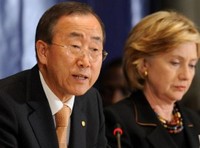Six Million Children Die of Hunger Every Year , U.N. Says
Ban Ki-moon, the U.N. secretary-general, laid out the sobering statistic as he kicked off a three-day summit on world food security in Rome on Monday.

"Today, more than 1 billion people are hungry," he told the assembled leaders. Six million children die of hunger every year -- 17,000 every day, he said , CNN reports.
It was alos reported, the world summit on food security officially opened with a call for decisive action for the total eradication of hunger in the world.
President Rupiah Banda, who arrived here yesterday, was among world leaders attending the three-day high level meeting being held at the Food and Agricultural Organisation headquarters in Rome.
He is accompanied by First Lady Thandiwe, Agriculture Minister Brian Chituwo and other senior Government officials.
In his opening statement, United Nations Secretary General Ban-Ki-Moon, said leaders needed to act now to increase food production in order to feed the one billion hungry people and secure the lives of millions others threatened with hunger worldwide.
Mr Ban said it was the duty of the international community not only to feed the hungry, but also to empower the hungry to feed themselves, AllAfrica.com reports.
Meanwhile, recent food price increases have lead to violent protests in Latin America, Africa and Asia, demonstrating the immediate impact the rise in basic commodity prices has had on the world's poorest populations. In spring 2008, Thailand, Burma, Laos, Vietnam and Cambodia agreed in principle to form a rice price-fixing body, the Organization of Rice Exporting Countries (OREC), amid soaring costs of basic grain. Such a food cartel, to be set up by 2012, would be similar to the oil cartel OPEC.
Developing countries which are net importers of food have been hit hardest by the hike in food prices , while net food exporting countries are making large profits. However, in the long term, rising food prices could help rural communities in some developing countries to escape poverty, increasing farmers' income.
Higher agricultural prices could increase public and private investments to programmes that improve productivity and infrastructure and spread production to marginal land. This in turn might stop increasing urbanization, as higher wages and increased labour demand would incite people to stay in rural areas.
Europe's Common Agricultural Policy (CAP) was initially created to support production and overcome food shortages induced by the Second World War. But it lead to overproduction and exported food surpluses to world markets, which in turn meant that developing countries faced unfair competition, AllAfrica.com reports.
Subscribe to Pravda.Ru Telegram channel, Facebook, RSS!





